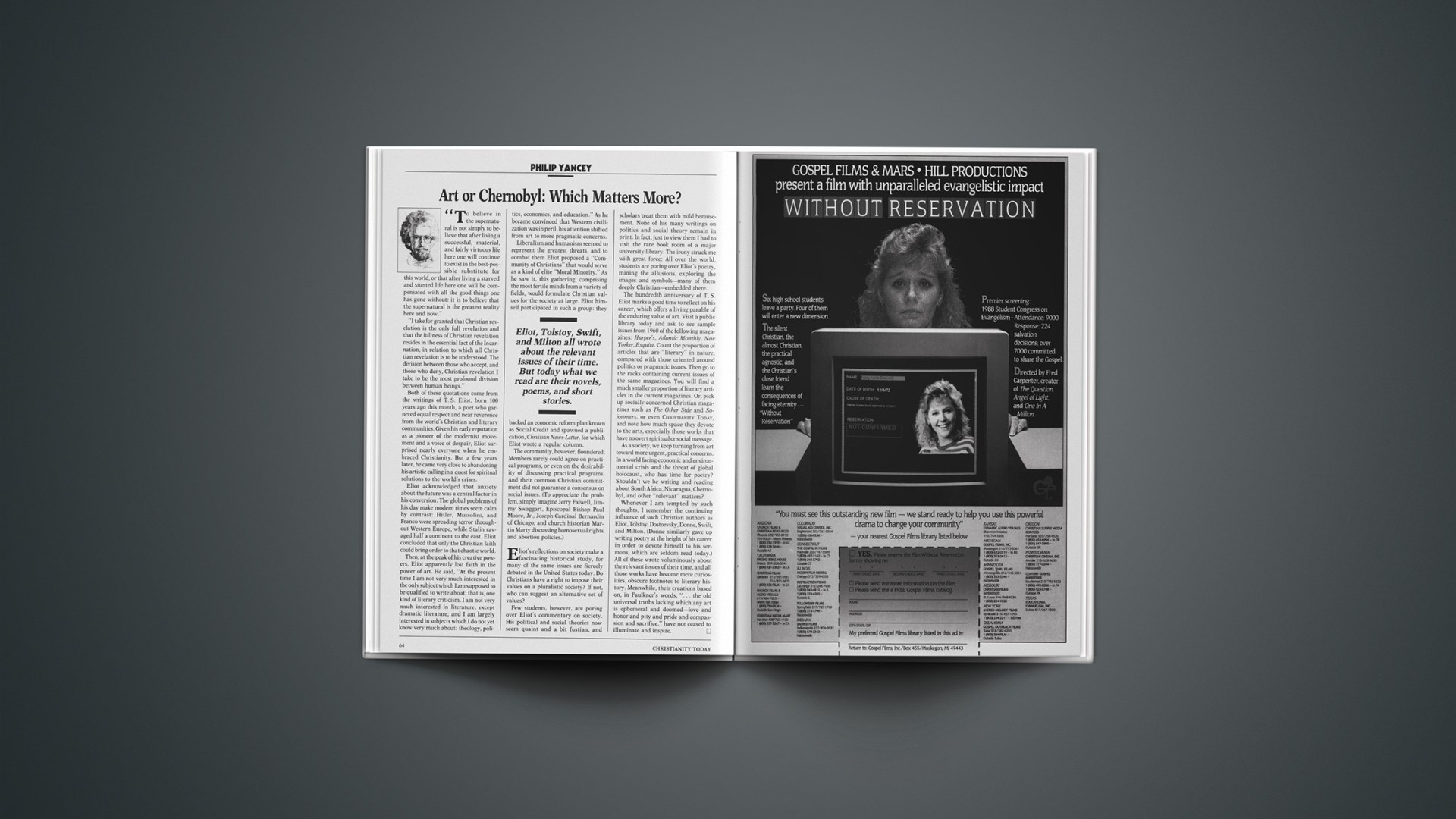“To believe in the supernatural is not simply to believe that after living a successful, material, and fairly virtuous life here one will continue to exist in the best-possible substitute for this world, or that after living a starved and stunted life here one will be compensated with all the good things one has gone without: it is to believe that the supernatural is the greatest reality here and now.”
“I take for granted that Christian revelation is the only full revelation and that the fullness of Christian revelation resides in the essential fact of the Incarnation, in relation to which all Christian revelation is to be understood. The division between those who accept, and those who deny, Christian revelation I take to be the most profound division between human beings.”
Both of these quotations come from the writings of T. S. Eliot, born 100 years ago this month, a poet who garnered equal respect and near reverence from the world’s Christian and literary communities. Given his early reputation as a pioneer of the modernist movement and a voice of despair, Eliot surprised nearly everyone when he embraced Christianity. But a few years later, he came very close to abandoning his artistic calling in a quest for spiritual solutions to the world’s crises.
Eliot acknowledged that anxiety about the future was a central factor in his conversion. The global problems of his day make modern times seem calm by contrast: Hitler, Mussolini, and Franco were spreading terror throughout Western Europe, while Stalin ravaged half a continent to the east. Eliot concluded that only the Christian faith could bring order to that chaotic world.
Then, at the peak of his creative powers, Eliot apparently lost faith in the power of art. He said, “At the present time I am not very much interested in the only subject which I am supposed to be qualified to write about: that is, one kind of literary criticism. I am not very much interested in literature, except dramatic literature; and I am largely interested in subjects which I do not yet know very much about: theology, politics, economics, and education.” As he became convinced that Western civilization was in peril, his attention shifted from art to more pragmatic concerns.
Liberalism and humanism seemed to represent the greatest threats, and to combat them Eliot proposed a “Community of Christians” that would serve as a kind of elite “Moral Minority.” As he saw it, this gathering, comprising the most fertile minds from a variety of fields, would formulate Christian values for the society at large. Eliot himself participated in such a group: they backed an economic reform plan known as Social Credit and spawned a publication, Christian News-Letter, for which Eliot wrote a regular column.
The community, however, floundered. Members rarely could agree on practical programs, or even on the desirability of discussing practical programs. And their common Christian commitment did not guarantee a consensus on social issues. (To appreciate the problem, simply imagine Jerry Falwell, Jimmy Swaggart, Episcopal Bishop Paul Moore, Jr., Joseph Cardinal Bernardin of Chicago, and church historian Martin Marty discussing homosexual rights and abortion policies.)
Eliot’s reflections on society make a fascinating historical study, for many of the same issues are fiercely debated in the United States today. Do Christians have a right to impose their values on a pluralistic society? If not, who can suggest an alternative set of values?
Few students, however, are poring over Eliot’s commentary on society. His political and social theories now seem quaint and a bit fustian, and scholars treat them with mild bemusement. None of his many writings on politics and social theory remain in print. In fact, just to view them I had to visit the rare book room of a major university library. The irony struck me with great force: All over the world, students are poring over Eliot’s poetry, mining the allusions, exploring the images and symbols—many of them deeply Christian—embedded there.
The hundredth anniversary of T. S. Eliot marks a good time to reflect on his career, which offers a living parable of the enduring value of art. Visit a public library today and ask to see sample issues from 1960 of the following magazines: Harper’s, Atlantic Monthly, New Yorker, Esquire. Count the proportion of articles that are “literary” in nature, compared with those oriented around politics or pragmatic issues. Then go to the racks containing current issues of the same magazines. You will find a much smaller proportion of literary articles in the current magazines. Or, pick up socially concerned Christian magazines such as The Other Side and Sojourners, or even CHRISTIANITY TODAY, and note how much space they devote to the arts, especially those works that have no overt spiritual or social message.
As a society, we keep turning from art toward more urgent, practical concerns. In a world facing economic and environmental crisis and the threat of global holocaust, who has time for poetry? Shouldn’t we be writing and reading about South Africa, Nicaragua, Chernobyl, and other “relevant” matters?
Whenever I am tempted by such thoughts, I remember the continuing influence of such Christian authors as Eliot, Tolstoy, Dostoevsky, Donne, Swift, and Milton. (Donne similarly gave up writing poetry at the height of his career in order to devote himself to his sermons, which are seldom read today.) All of these wrote voluminously about the relevant issues of their time, and all those works have become mere curiosities, obscure footnotes to literary history. Meanwhile, their creations based on, in Faulkner’s words, “… the old universal truths lacking which any art is ephemeral and doomed—love and honor and pity and pride and compassion and sacrifice,” have not ceased to illuminate and inspire.










